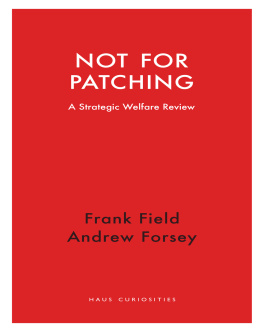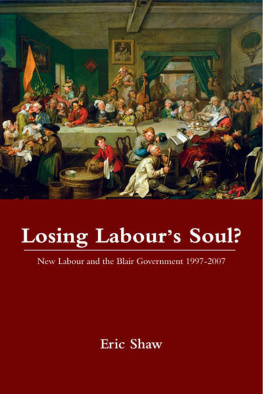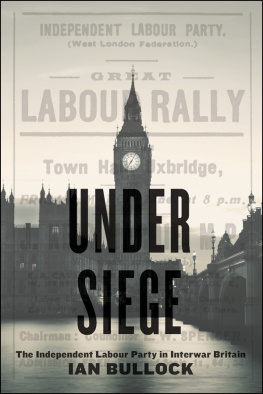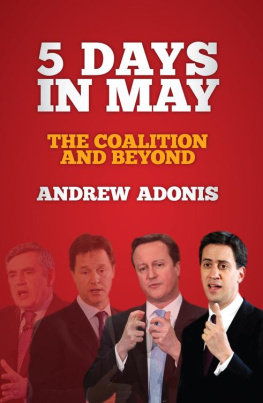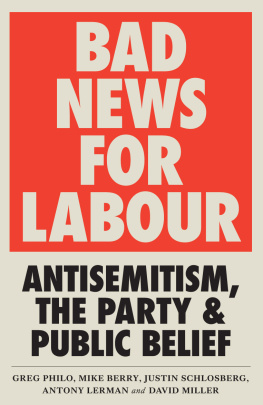Fourth Estate
An imprint of HarperCollinsPublishers
1 London Bridge Street
London SE1 9GF
www.harpercollins.co.uk
First published in paperback 1993
Copyright Frank Field 1993
Frank Field asserts the moral right to be identified as the author of this work
A catalogue record for this book is available from the British Library
All rights reserved under International and Pan-American Copyright Conventions. By payment of the required fees, you have been granted the nonexclusive, nontransferable right to access and read the text of this e-book on-screen. No part of this text may be reproduced, transmitted, downloaded, decompiled, reverse-engineered, or stored in or introduced into any information storage and retrieval system, in any form or by any means, whether electronic or mechanical, now known or hereafter invented, without the express written permission of HarperCollins e-books.
HarperCollinsPublishers has made every reasonable effort to ensure that any picture content and written content in this ebook has been included or removed in accordance with the contractual and technological constraints in operation at the time of publication.
Source ISBN: 9780006382263
Ebook Edition JUNE 2016 ISBN: 9780008192044
Version: 2016-06-03
For Nick and Cathy Warren
CONTENTS
While I have added a substantial amount of new material, this book began life as the University of Durhams Bernard Gilpins Pastoral Lectures for 1993. My first thanks goes to the Department of Theology who invited me to Durham. The magnificence of that city was matched by spring weather and the hospitality of Sheridan Gilley, the Chairman of the department, Meg Gilley and Sheridans colleagues.
A second wave of thanks goes to four people. Jill Hendey worked on the manuscript in addition to all her other work. Matthew Owen did likewise, as well as trace material and discuss with me the books line of argument. I am particularly grateful to them for absorbing the considerable amount of extra work that producing a book entails, and doing so in such a way as to make working with them such a pleasure. Damian Leeson went through the whole document and sharpened both the prose and presentation. In Rebecca Wilson I was the beneficiary of being given by HarperCollins an editor whose talents were matched by a dedication to a production of books of the highest technical quality.
John Grigg, Lord Bonham Carter and Calum MacDonald read through the first draft of the introduction. I am grateful to them for their comments. In addition, Mark Bonham Carter read through the original lectures, commented upon and encouraged me to publish them. He also kindly thought of the books title. Robert Twigger, Robert Clements, Richard Cracknell, Adrian Crompton, Richard Dewdney, Nicola Chedgey, Ed MacGregory, Mahmed Nawaz and Jane Dyson of the House of Commons Library produced a number of statistical papers, and Dora Clark and Andrew Parker traced innumerable sources for me. MPs are blessed by having a library research staff whose qualities are unsurpassed. While I am grateful to all these people who helped produce this volume, its opinions are my responsibility, as are any errors which have escaped their watchful eyes.
The book is dedicated to Nick and Cathy Warren. Nick worked with me as solicitor to the Birkenhead Resource Unit and Cathy too worked for the Unit in a voluntary capacity. During Nicks twelve years stewardship my constituents received a Rolls-Royce legal service. His standing in the town is testament to that, as was my vote at general elections. Due largely to the happy fallout from Nicks work, of which I was the beneficiary, Birkenhead was turned into one of the safest seats in the country. The books dedication is, therefore, a small but public means of thanking Nick and Cathy for the care they lavished on so large a number of my poorer constituents.
FRANK FIELD
June 1993
Poor old George Bush got it right. Stumbling through the presidential election campaign he realized what was missing. In true Bush style he blurted out that he was short on the vision thing. What was true of the defeated Republican campaign is also true for a defeated Labour Party.
The vision thing affects both Government and Opposition parties. That the Government is almost bankrupt of ideas is not surprising. Four election wins in a row and fourteen years in office is enough to convince any group of human beings that they are destined to remain there to the end of their days. Winning, after all, is the major test, so why worry too much if Cabinet Ministers cannot spell out in precise terms what the Government is trying to achieve? And yet?
In times past the pendulum has always swung back. So why wont it next time? That must be the worry at the back of the mind of every Government supporter. It is, however, far from the back of the mind of Labour activists. In order to talk up morale a political law of averages reigns in Labour Party thinking. No swing back on the last three occasions makes it more, not less, certain that the swing will occur next time. It is a belief of all gamblers that their chances improve the more they lose. This is not the case, neither in the casino nor in the election arena. Political memories are inevitably short. No member of the current House of Commons was elected to the 1945 Parliament, so that the pendulum years appear to most politicians as the natural rhythm of politics. But such a pattern does not fit the decades before 1945 when the Conservatives were rarely out of power. The dreadful thought which ought to be stalking the Left is that the close fought elections of the early 1950s and mid-1970s might prove to be the exceptions rather than the rule.
Fundamental changes have been taking place which make a regular sharing of power between the two main parties a less, rather than more, likely future turn of events. For one thing, the swings which do occur, and which would have swept the board for the Opposition party, now merely reduce the overall size of the Governments majority in the House of Commons. The 2 per cent swing gained last time by Neil Kinnock would have been enough to land him in Downing Street if only the election had been held in the 1950s rather than in the 1990s. It is the size of the Governments lead amongst voters on election day, combined with the disappearance of the traditional marginal seat, which is part of the stumbling block. The clear polarization into ever more safe seats presents a microcosm of what is happening across the country.
The nagging doubt of many Labour activists is that the change in British politics is more fundamental than this. Two forces are at work. The first is that the social groups from which Labours traditional support has come have shrunk, are shrinking and look set to shrink further. It is as though Labour is trying to advance on a downward moving escalator.
But why is Labour on a down escalator in the first place? Here lies the second and more deadly of the two forces working against the Party. A large number of people raised in Labour-voting homes have simply walked away from the Party. In fairness many of these people would argue that Labour has simultaneously been marching off in a different direction anyway. These voters compare their past loyalty to Labour to the bonds which they used to have with their school friends. At the time, few people could be more important. However, even in the most stable of circumstances people can grow apart. Britain, far from being stable, has seen not merely the collapse of its traditional manufacturing base but of new strains throughout its social fabric. Partly as a result of this, but also because of rising living standards, people are on the move. A third of all households moved during the last decade. Old ties and friendships are thus broken, commitments reduced to memories which are valuable as part of our past, but definitely no longer of present significance. As with the ties of friendship, so too with political parties.


